by Anna Bower, Benjamin Wittes
Lawfare
Wednesday, April 5, 2023, 12:33 AM
Judge Juan Merchan of the Supreme Court of New York opens the hearing by asking both the government and counsel for former President Donald J. Trump whether there’s anything they need “to address before we conduct the arraignment.”
Christopher Conroy for the prosecution and Todd Blanche for the defense agree that there is nothing.
“Let’s arraign Mr. Trump,” says the judge.
And the court proceeds to arraign the 45th President of the United States—the first president ever to face criminal charges:
THE CLERK: Donald J. Trump, the grand jury of New York County has filed indictment 71543 of 2023 charging you with the crimes of 34 counts of falsifying business records in the first degree. How do you plead to this indictment, guilty or not guilty?
MR. TRUMP: Not guilty.
Judge Merchan quickly turns things over to Conroy, who in a businesslike fashion thanks the judge and declares that the state is “filing with the Court and handing to counsel copies of the indictment and a statement of facts.” He also declares that he is giving defendant’s counsel a copy of Trump’s fingerprint report. And he says that the indictment was unsealed at 1:30 pm and given to defendant’s lawyers in advance of the hearing.
He notes that the grand jury “listened to the evidence and carefully considered the charges [and] has voted an indictment against the defendant, Donald J. Trump, charging him with 34 separate felony counts of falsifying business records in the first degree in violation of New York State Penal Law section 175.10.” He says that his colleague in the district attorney’s office, Catherine McCaw, will address discovery issues, motions, and a possible trial date. But he wants first to address “what this case is about, the defendant’s recent public statements, conditions of release, and the conflict matter [we] believe the Court should be aware of.”
Judge Merchan allows him to proceed.
In Conroy’s telling, this case is about the fact that Trump “falsified New York business records in order to conceal an illegal conspiracy to undermine the integrity of the 2016 presidential election and other violations of election laws.” Beginning in August 2015, he argues, Trump “agreed with others to carry out an unlawful plan to identify and suppress negative information that could have undermined his candidacy for President.” He then summarizes the allegations in the indictment and statement of facts. “Defendant falsified these New York business records with the intent to defraud, including the intent to commit another crime, and to aid and conceal the commission of another crime,” he argues.
He emphasizes that, “This office has long prioritized protecting the integrity of business records maintained here in New York County. When those records are falsified in service of another crime, it is a felony.”
He then turns to what he terms Trump’s “recent public statements threatening our city, our justice system, our courts, and our office.” Over the past few weeks, he says, Trump “has made a series of threatening and escalating communications,” a series that has included “irresponsible social media posts that target various individuals involved in this matter, and even their families.” These statements, he alleges, have “threatened potential death and destruction . . ., and World War III . . . if these charges were brought and he was indicted.” Trump’s statements directly addressed the grand jury itself and ”disparaged witnesses” who had reportedly participated in the investigation. Trump has also threated the district attorney’s office, “including posting a picture that depicts Mr. Trump wielding a baseball bat at the head of the district attorney.”
Trump’s comments have required “extensive public safety measures” by “a number of law enforcement agencies” starting weeks ago.
He turns over to the court and to Trump’s counsel what he terms “several of the defendant's recent online posts as an example” of “this kind of threatening rhetoric.” And he expresses “significant concern” about the danger Trump’s rhetoric poses “to our city, to potential jurors and witnesses, and to the judicial process.”
He insists, however, the district attorney’s office will not be deterred.
One way, he suggests, of addressing Trump’s conduct would be for the court to issue “an appropriately restrictive protective order concerning discovery materials, so that his lawyers can access the information they need to prepare a defense, while at the same time, making sure the defendant does not disseminate any information provided as discovery through threatening online posts.” McCaw, he says, will address this further. Of course, “the terms of any protective order the Court enters can . . . be carefully policed through contempt proceedings and other sanctions as necessary.”
While the government is only seeking a protective order regarding discovery materials, Conroy notes that Trump’s rhetoric directed at individuals and their families “may also raise concerns about the fair and orderly administration of justice, the risks that pre-trial publicity will taint the jury pool and prejudice a fair trial, and individual and public safety concerns.” And the district attorney’s office is thus considering seeking other possible relief as well and “would be prepared to submit briefing if the Court requests.”
He then turns to the question of conditions of Trump’s release. He notes that under New York law these charges are not eligible for bail and that Trump surrendered voluntarily for processing and arraignment. He asks Judge Merchan “to give the defendant Parker warnings”—advising him of his right to be present at trial and of the consequences of his non-appearance. “Should the defendant decide not to return to court from out of state, these warnings would help mitigate potential issues around any extradition proceeding.” He says that if circumstances change and the prosecution believes it needs modifications to the these conditions, it will bring the matter to the court’s attention.
Finally, he raises the issue of a possible conflict of interest on the part of Joseph Tacopina, one of the lawyers for Trump. “Our understanding [is that] he previously had privileged communications with Stormy Daniels, who we expect to be a witness in this case,” he says. He consequently asks for the judge to “conduct an inquiry at an appropriate time” of both Tacopina and Trump about potential conflicts arising out of this prior relationship. He says he received a letter sent by Daniels’s current counsel on Monday and would happily share it with the court and Trump’s lawyers.
And then he tries to turn things over to McCaw.
But McCaw doesn’t get her turn just yet. Todd Blanche, the former federal prosecutor whom Trump added to his defense team only yesterday pipes up. “Your Honor, thank you,” he begins. “I didn't realize we were going to give opening statements today. I would appreciate the opportunity to respond.”
Blanche complains that the prosecution had “ten minutes” to talk about “the strength of their case.” Yet, he continues, “this is no trial” and the defense has not had an opportunity to view discovery yet.
Then he shifts to the subject of the prosecution’s key witness: the President’s former fixer, Michael Cohen. Cohen, he complains, stood on the courthouse steps every time he met with prosecutors or the grand jury and announced exactly what he did and why he did it.
It’s true, Blanche acknowledges, that Trump has responded “forcefully” to the events of the past several weeks, and that he’s “absolutely frustrated, upset, and believes that there is a grave injustice happening.” Still, Blanche says, the prosecution’s efforts to give “their version” of the indictment today has “exacerbated” the problem.
Before Blanche can continue, Judge Merchan interjects. The prosecutors, he clarifies, are merely “complaining about the rhetoric and the charged nature of the language that is being used” by the former President. In response, Blanche contends that Trump has free speech rights to talk about his view of what is happening in this case. And, he continues, it’s important to “step back” and realize this case has been investigated for several years. He adds that Mark Pomerantz, a former special assistant district attorney with the Manhattan district attorney’s office, wrote a whole book about the investigation, which he has publicly discussed.
Meanwhile, Blanche points out, “the President” is running for reelection as President of the United States. “I mean, imagine anybody in this courtroom that was in that position,” he urges before reiterating that this was a three-year investigation plagued by “leaks galore.” As one example, he points out that Trump only received a copy of the indictment 40 minutes before the hearing, while the media “apparently” received a copy of the indictment last night. “That is a grave injustice,” he proclaims.
Clearly, Trump is “frustrated” by all of this, Blanche continues. But his posts, he says, “are not threats, they are not harassment.” While the prosecutors may disagree with the “rhetoric,” Blanche says it is “patently unfair” to frustrate the freedom of speech of a man who is running for President of the United States.
In reply, Judge Merchan acknowledges that Trump “does have rights.” But, he says, “I don’t believe the People are asking the Court to impose any kind of gag order.” When Blanche agrees that is correct, Judge Merchan continues: “Certainly, the Court would not impose a gag order at this time even if it were requested.” He observes that such restraints “are the most serious and . . . intolerable on First Amendment rights,” which applies “doubly” to Trump because he is a candidate for the presidency of the United States. Still, Judge Merchan says that he doesn’t share Blanche’s view “that certain language and certain rhetoric is just by frustration.” So though Judge Merchan won’t enter a gag order, he “would encourage counsel on both sides to speak to their witnesses and the defendant” and “remind them” to “please refrain from making comments or engaging in conduct that has the potential to incite violence, create civil unrest, or jeopardize the safety or well-being of any individuals.” Additionally, “please do not engage in words or conduct which jeopardizes the rule of law, particularly as it applies to these proceedings in this courtroom.” If this request isn’t taken seriously, Judge Merchan warns that he would “have to take a closer look” at the option of issuing an order to restrict such speech.
McCaw now gets her turn to speak. She has three matters to address. First up is the protective order she describes herself as “in the process of working out with defense counsel.” The second issue is discovery. And the final one is scheduling.
On the protective order, she argues, “especially in light of the defendant's public comments, that a protective order is vital to insure the sanctity of the proceedings as well as the sanctity of the discovery materials.” She says the prosecution has had “a number of very productive conversations” with defense counsel on the subject and that she believes “we are very close to agreement and finalizing the language.” When “we do reach an agreement, we should be able to submit that language to the Court within the next few days, hopefully.”
The proposed order, she notes “would have terms that would be binding not solely on defense counsel, but also on the defendant himself, and that should the defendant fail to abide by these terms, it could have the effect of being in contempt of court.” She says she wants to highlight three terms on which the defense and the prosecution have already agreed:
• Trump “may not use any of the materials the prosecution produces for any purpose other than to prepare a defense.”
• Trump “will be permitted to review certain sensitive materials only in his attorney's office, and he may not take copies of the documents” or notes on them away from his lawyers’ offices.
• Trump “may not provide the materials he receives through the discovery process to any third party, including the press, and he may not post them to social media.” She describes this third provision as perhaps the most important one.
She emphasizes that violations of these provisions would put Trump in contempt of court.
Judge Merchan pauses at this point and asks defense counsel to weigh in on the protective order matter. Susan Necheles handles this matter for the defense. She confirms that the defense and prosecution are working on the matter and hope to reach agreement.
That said, she notes that the prosecution “in their statement of facts here have laid out what they, I assume, contend the grand jury evidence and the testimony showed.” She says it seems fundamentally wrong to her that the prosecution is “able to put out into the public a statement of what they believe the facts are and for the defense and someone who is defending his career, his reputation, everything that he's built in his entire life for him not to be able to respond in the same manner.” So there need to be “further discussions,” but she hopes to do that “promptly.”
Judge Merchan expresses his hope that the two sides can agree on the order “so all I have to do is sign it.”
But now Tacopina has a protective order problem. “I know the D.A said the review by the defendant would have to be in the attorney's office,” he says. But “that will not happen. I thought it was in the attorney's presence. We would meet most likely at the office of President Trump.”
Judge Merchan sees that perhaps the two sides are not that close to agreement after all. “All right,” he says. “Since you are still negotiating, I will not weigh in at this time. If you reach an impasse and you need my help in resolving anything, let me know and I'll try to help out.”
And with that, we are on to discovery.
McCaw says that once the protective order is in place, the prosecution will begin “rolling productions of discovery.” This will take place in three phases.
• The first stage will involve grand jury minutes and exhibits, witness statements and the like. This will take about a week after a protective order is in place.
• The second stage “will consist of subpoena compliance, other witness materials, as well as some police documents and other odds and ends.” She says this will take place within the statutorily allocated 65 days.
• The third stage will include materials like district attorney’s office email messages. She doesn’t know how long this will take.
She says the most important materials will be produced in the first and second stages, particularly the first.
As the government intends to seek a trial date of Jan. 5, 2024 and there is intense public interest in “moving this case along as expeditiously as possible,” she says the government wants to produce these materials quickly to allow ample time for trial preparation before January.
Judge Merchan turns to Blanche, who starts by emphasizing again that this has been a long investigation and the defense has not seen any discovery so far. Trump certainly wants this whole matter behind him, Blanche says, “But to sit here and say January of 2024 is good with us when we have not seen a piece of paper yet, is I think patently unfair for us given everything that I think we know about the case from the media and from witnesses talking.” The January 2024 date is “a little bit aggressive.” The spring of 2024 might be “a more realistic plan at this point.” But Blanche admits that he’s “speculating a bit because we have not seen anything yet.”
The court agrees that it’s difficult to anticipate being ready in January having not received any discovery yet. “The message I would like to deliver is we would like to move ahead as expeditiously as possible, without undue delay. Of course, you are entitled to the discovery. You are entitled to review the discovery and make determinations there.”
McCaw next turns to the schedule. “I believe that the next step would be to set an appropriate motion schedule,” she said. She says she has a schedule of dates she is ready to propose but suspects Judge Merchan will want to hear from the defense. And he does.
Ordinarily, Judge Merchan tells Blanche, he would get 45 days to file its motions. But the judge knows this is a “much more complex case,” and in recent complex cases, he has extended the motion schedule. He asks Blanche what he’s thinking. Blanche responds that “we strongly believe there will be substantive motions addressing the substantive facts of the indictment that could be dispositive.” These motions may happen only after discovery, because they may depend on material received from the government. But “to move the case along expeditiously,” he says, “there may be other motions that do not need to wait for the substantive motions several months from now after the conclusion of discovery.” For example, while the defense just got the statement of facts today, it may seek a bill of particulars. “That might also be something we need before we start going through all the discovery.”
Hence, Blanche asks the judge for an “opportunity to study the indictment beyond the half an hour or so we had so far.” And he asks for an opportunity to file motions in two parts. He says he will consult with the prosecution and the court “as we land on the specifics” with respect to timing. “So I don't know if it is worth setting a date now, but if the Court would like to, we say at least six weeks after discovery has been concluded, and for other potential motions that we will reach out to the Court about, we would ask to have a month to file those motions or to at least inform the Court of what motions we intend to file.”
Judge Merchan now wants to clarify how long discovery is going to take. McCaw tells him again that the government can finish the “vast majority” of the production within 65 days of arraignment but acknowledges that there might be “some additional straggler materials”— especially with respect to emails from within the district attorney’s office. She asks for the motion schedule to be set in advance, even if the motions are to be divided.
Judge Merchan notes that 65 days from today brings the court to mid-June. He says he doesn’t want two sets of motions, and he says he means to set one motions schedule. “I think four months would be more than sufficient for you to be able to address your motions, so that would bring us out to August 8.”
Blanche offers “one caveat.” If the defense decides it needs to file a motion in advance of that, he will alert the court “and obviously your Honor can guide us.” Other than that, the court’s motions schedule works for him.
Judge Merchan does some calculations and determines that the government’s responses would be due on September 5. McCaw says if the defense is getting six weeks, she should as well for her responses, which would mean her responses should be due on September 19.
But Judge Merchan says he’s not giving the defense six weeks. He’s giving them four months from today to complete all their motions. She asks again “if we could get six weeks from the date of the filing of their motions, in light of the amount of time they will have had to prepare the motions, we request a date of September 19.” Judge Merchan obliges.
He now turns to the subject of the possible conflict of interest on the part of Tacopina. Tacopina asks to be heard on the subject. He states that “we received last night, for the first time, a letter from a Clark Brewster, an attorney apparently representing Stormy Daniels, that was larded with factual inaccuracies.” The most important was that “I never met Stormy Daniels. I never spoke to Stormy Daniels, and I never reviewed any documents of Stormy Daniels.” Daniels called Tacopina’s office and “tried to hire me or asked about hiring me. She spoke to an associate and paralegal. Gave some facts. Sent over a document, and it went no further than that.”
Under the ethics rules, he says, with respect to the attorney’s duty to prospective clients, “I have to be in possession of information that is significantly harmful to the person in the matter.” No such material exists. “Everything she sent us wound up in her book. So, there is not obviously any privilege, and any that existed was waived.”
What’s more, he argues, he has learned that Daniels “signed a waiver” when she turned over material to federal prosecutors. “She testified in open court about her attempt to secure representation prior to retaining Mr. [Michael] Avenatti.” Moreover, if any conflict really existed, the “remedy would be I do not participate in her examination” if and when she testifies. “There are three different law firms here. It is as simple as that.”
Now Judge Merchan turns to Conroy for argument on behalf of the district attorney’s office on the matter: “People, what was your basis for believing there might be a conflict?”
Conroy responds that the district attorney’s office believes that Tacopina has a conflict based on a “combination” of the letter received, comments made on various TV networks, and the fact that there were “some” privileged conversations between Tacopina and Daniels. He reiterates that he merely sought to “alert” the Court to the potential issue. “I think it is a real potential issue that needs to be explored,” he finishes.
Having heard the positions of both the prosecution and the defense on the matter, Judge Merchan tells Conroy that he would “welcome” a written motion on it should the district attorney decide to file one. “In the meantime,” Merchan continues, “I do believe I have an obligation to address both Mr. Tacopina and Mr. Trump with regard to this.” He then instructs Trump of his absolute right to “conflict-free” representation. While he stresses that he is “not making any findings of fact” at this point, he informs Trump that prosecutors have alleged that Tacopina has a potential conflict because he “may have represented a former client” who is a witness in the case. “Do you understand that right, Mr. Trump?”
The 45th President of the United States responds with a single word: “Yes.”
Moving on, Judge Merchan next announces that the state has asked him to give Trump what are called “Parker warnings”—a set of judicial admonitions provided to criminal defendants in New York state court. "This is something I do with every individual who appears before me in the courtroom," Judge Merchan says.
He then proceeds to inform Trump that he has a right to be present at “every stage” of the proceedings in his case. However, the judge warns Trump that there are ways he could lose or waive his rights to be present at the proceedings. Trump could, for example, “voluntarily absent” himself from the proceedings. If he does so, Merchan says that the Court has the right to find that he voluntarily waived his right to be present, which could mean that the proceedings would continue in his absence. Another way Trump could waive his rights to be present for the proceedings is to become disruptive to such a degree that it affects the judge’s ability to preside over the case. In that situation, Merchan warns, he would have the authority to remove Trump from the courtroom and continue the proceedings without him.
“Do you understand that?” Judge Merchan asks Trump.
The former President of the United States and current presidential candidate answers in the affirmative: “I do.”
Having read Trump his Parker warnings, Judge Merchan is ready to wrap up. “Now I think we need to set an adjournment date.” Trump, he continues, will be released “on his own recognizance”—that is, without bail. The judge announces that the next hearing date will be set for Dec. 4, 2023, for the Court’s decisions on various pre-trial motions. “If, for some reason, I'm unable to have my decisions ready or not all the decisions ready, I will certainly let you know,” he tells counsel.
Before the judge adjourns the hearing, however, Blanche pipes back up on behalf of Trump. “Judge,” he says, “I am just stating the obvious that having President Trump in this courtroom today is extraordinarily burdensome and expensive on the city,” he states. Adding that the “security issues” that needed to be worked out ahead of Trump’s appearance today were substantial, he informs the judge that defense counsel may ask that Trump’s presence be waived for future hearing dates.
“What would be the reason [for] asking to waive his appearance?” Judge Merchan queries. In reply, Blanche again emphasizes “the incredible expense and effort and security issues that present themselves with the President traveling and being in court.”
While Judge Merchan acknowledges that Trump’s appearance has been a “huge undertaking” for the court, he reminds Blanche that Dec. 4 is “quite a ways out.” If a reason were to come up that Trump could not appear on that date, such as something unanticipated, he says that defense counsel can run it by him then. “But in the same way I expect all other defendants to appear in court, even high profile defendants…I think in the interest of transparency and assuring the rules of law even-handedly, at this time I'm going to deny your application.”
Thanking the judge, Blanche stresses that he “was not suggesting President Trump does not want to be here.” Instead, he says, the cost of the arraignment to the city is why he brought the matter up today. “To the extent we need to, we will revisit it,” he finishes.
“What you said is true, and I agree,” Judge Merchan responds.
Then the judge addresses the courtroom at large: “Thank you all very much.”
And with that, the first arraignment of a United States president comes to an end.
****************************
What It Was Like Inside the Courtroom During Trump’s Arraignment: Here are some of the most important moments from the hearing where criminal charges against Donald Trump were unveiled.
by Jonah E. Bromwich and Nate Schweber
New York Times
April 5, 2023
NOTICE: THIS WORK MAY BE PROTECTED BY COPYRIGHT
YOU ARE REQUIRED TO READ THE COPYRIGHT NOTICE AT THIS LINK BEFORE YOU READ THE FOLLOWING WORK, THAT IS AVAILABLE SOLELY FOR PRIVATE STUDY, SCHOLARSHIP OR RESEARCH PURSUANT TO 17 U.S.C. SECTION 107 AND 108. IN THE EVENT THAT THE LIBRARY DETERMINES THAT UNLAWFUL COPYING OF THIS WORK HAS OCCURRED, THE LIBRARY HAS THE RIGHT TO BLOCK THE I.P. ADDRESS AT WHICH THE UNLAWFUL COPYING APPEARED TO HAVE OCCURRED. THANK YOU FOR RESPECTING THE RIGHTS OF COPYRIGHT OWNERS.
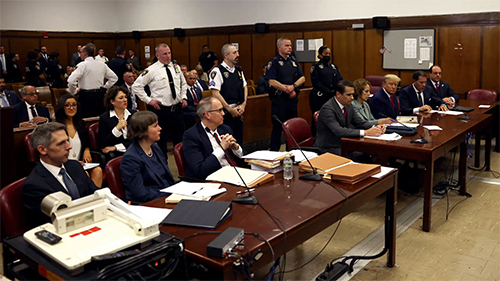
The scene on Tuesday for the arraignment of former President Donald J. Trump, seated third from right. Credit...Pool photo by Andrew Kelly
Former President Donald J. Trump sat quietly in a Manhattan courtroom on Tuesday as prosecutors described the accusations against him. The proceeding marked his first experience as a criminal defendant.
A 32-page transcript of the hearing offers only a hint of the dramatic implications of the arraignment and the lengthy legal process to come. It was one of the most-anticipated court proceedings in the world. And yet, it was seen firsthand only by the few dozen people who were present in the courtroom where the charges against Mr. Trump were unveiled.
Here are some of the most important moments from the arraignment:
The hearing begins, and Mr. Trump pleads.
THE COURT: Let’s arraign Mr. Trump.
THE CLERK: Donald J. Trump, the grand jury of New York County has filed indictment 71543 of 2023 charging you with the crimes of 34 counts of falsifying business records in the first degree.
How do you plead to this indictment, guilty or not guilty?
DEFENDANT MR. TRUMP: Not guilty.
The shades were down in the courtroom when Mr. Trump entered around 2:30 p.m., wearing a navy suit, a red tie and a blank expression. Armed court officers flanked him on both sides as he walked down the aisle toward the front. Photographers were briefly allowed to enter the jury box to take his picture, and he turned and stared at the cameras until their operators were made to leave.
Mr. Trump’s arraignment did not begin immediately after he came in. He was compelled to wait about 10 minutes, seated silently at the defense table, as a lawyer representing media organizations requested that journalists be granted more access to the proceeding. Mr. Trump visibly scoffed when that lawyer asserted that professional journalists could be trusted.
When that lawyer was finished speaking, the judge, Juan M. Merchan, referred to in the transcript as “The Court,” called for Mr. Trump to be arraigned. The former president was read the charges against him — 34 felony counts of falsifying business records. In the hushed courtroom, Mr. Trump leaned forward and, speaking into the microphone at the defense table, said that he was not guilty.
A prosecutor previews the case.
MR. CONROY: The defendant, Donald J. Trump, falsified New York business records in order to conceal an illegal conspiracy to undermine the integrity of the 2016 presidential election and other violations of election laws.
Chris Conroy, a prosecutor with the Manhattan district attorney’s office, then stood up and began to detail the charges. They stem from a hush-money payment that Mr. Trump’s former fixer, Michael D. Cohen, paid to a porn star, Stormy Daniels, in the run-up to the 2016 election. Mr. Trump reimbursed Mr. Cohen after he was elected. Prosecutors are accusing Mr. Trump of orchestrating the creation of false business records related to the reimbursements.
Falsifying business records is only a felony in New York State when it is committed with the intent to “commit or conceal” another crime. In saying that Mr. Trump had falsified records “to conceal an illegal conspiracy,” Mr. Conroy offered a potential preview of the office’s broader case against Mr. Trump.
Members of the defense team were handed copies of the indictment. Mr. Trump passed a copy to one of his lawyers, Joseph Tacopina. The former president was the only person at the defense table not to accept a copy.
Mr. Trump’s recent social media posts are entered into the record.
An extraordinary moment came when Mr. Conroy began to reference Mr. Trump’s recent social media posts. The former president promised that “death and destruction” would follow were he to be charged and posted racist language and threatening images directed at the district attorney, Alvin L. Bragg.
MR. CONROY: We have significant concern about the potential danger this kind of rhetoric poses to our city, to potential jurors and witnesses, and to the judicial process.
Mr. Conroy then passed out printed copies of Mr. Trump’s posts to the judge and defense team. Mr. Trump passed his copy to Mr. Tacopina, but a minute later requested it back, beckoning with his right hand. Another of his lawyers, Todd Blanche, objected strongly to Mr. Conroy’s comments about the social media posts.
MR. BLANCHE: It is true that President Trump has responded, and responded forcefully. It is true that as part of that response, he’s absolutely frustrated, upset, and believes that there is a grave injustice happening with him being in this courtroom today.
Mr. Blanche asserted that Mr. Trump “ has rights, he’s allowed to speak publicly.”
That appeared to prompt Justice Merchan, who spoke calmly and soberly, to respond that he had no immediate intention of placing a “gag order” on Mr. Trump, counter to concerns expressed recently by the former president’s legal team. Prosecutors have not requested a gag order.
THE COURT: Certainly, the court would not impose a gag order at this time even if it were requested.
Such restraints are the most serious and least intolerable on First Amendment rights. That does apply doubly to Mr. Trump, because he is a candidate for the presidency of the United States. So, those First Amendment rights are critically important, obviously.
But Justice Merchan, a judge in the State Supreme Court since 2009, did warn the defense to speak to Mr. Trump “and anybody else you need to, and remind them to please refrain from making statements that are likely to incite violence or civil unrest.”
[JUDGE MERCHAN] PLEASE REFRAIN FROM MAKING COMMENTS OR ENGAGING IN CONDUCT THAT HAS THE POTENTIAL TO INCITE VIOLENCE, CREATE CIVIL UNREST OR JEOPARDIZE THE SAFETY OR WELL-BEING OF ANY INDIVIDUALS.... DO NOT ENGAGE IN WORDS OR CONDUCT WHICH JEOPARDIZE THE RULE OF LAW, PARTICULARLY AS IT APPLIES TO THESE PROCEEDINGS IN THIS COURTROOM.... IF I WERE TO BE HANDED SOMETHING LIKE THIS AGAIN IN THE FUTURE, I WOULD TAKE A CLOSER LOOK AT IT.
The prosecution details potential constraints on Mr. Trump.
MS. MCCAW: Defendant may not provide the materials he receives through the discovery process to any third party, including the press, and he may not post them to social media.
As Mr. Trump continued to sit in silence, Catherine McCaw, another prosecutor, told the judge that her team was working with Mr. Trump’s lawyers to draft a protective order, a document that would place certain constraints on Mr. Trump.
One of those constraints, she said, would bar the former president from posting certain case material on social media, or from sharing it with reporters. Were Mr. Trump to violate any constraints that are in place, Justice Merchan would decide whether and how to sanction him.
Mr. Trump speaks again.
As his arraignment went on, Mr. Trump increasingly fidgeted. He wove and unwove his fingers repeatedly. He crossed and uncrossed his arms. He knocked his knuckles on the hardwood table. Once, he puffed out his cheeks in a sigh.
Finally, more than a half-hour after he entered his plea, he spoke again — after being prompted by his lawyers — but only to respond to Justice Merchan when the judge informed the former president about his right to be present at proceedings — and the ways that right could be forfeited.
THE COURT: If you become disruptive to such a degree that it affects my ability to preside over this case and my ability to ensure that the case is treated the way it needs to be treated for both sides, I do have the authority to remove you from the courtroom and continue in your absence, do you understand that?
DEFENDANT MR. TRUMP: I do.
The judge requests Mr. Trump’s presence.
THE COURT: I expect all other defendants to appear in court, even high-profile defendants.
Given that Mr. Trump was charged with nonviolent crimes, prosecutors were barred from even requesting that he be put in jail. As Justice Merchan prepared to release the former president, Mr. Blanche suggested that Mr. Trump might not appear at his next court date, scheduled for Dec. 4. When asked for his reasoning, Mr. Blanche cited “the incredible expense and effort and security issues” that attended the arraignment.
The judge acknowledged that it had been a huge undertaking for everyone involved. But he noted that December was “quite a ways out.” Finally, he noted that “in the interest of transparency and assuring the rules of law evenhandedly,” he was going to disagree with Mr. Blanche. The implication: As much as possible, the judge intends to treat Mr. Trump like any other defendant.
When the arraignment adjourned around 3:25 p.m., Mr. Trump was the slowest person at the defense table to stand up. He smoothed the lapels of his blue suit jacket, neatened a stack of paper in front of him and walked out of the courtroom.
Hurubie Meko, Kate Christobek and Jason Silverstein contributed reporting.
Jonah E. Bromwich covers criminal justice in New York, with a focus on the Manhattan district attorney's office, state criminal courts in Manhattan and New York City's jails. @jonesieman
*******************
Judge warns ‘defendant’ Trump: Ari Melber breaks down lengthy arraignment
by Ari Melber
MSNBC
4/5/23
The transcript from Donald Trump’s first court appearance shows Trump’s shift from candidate to criminal defendant. Judge Juan Merchan began Trump’s arraignment on the offensive over Trump’s recent threats and rejected Trump’s request to skip the next court hearing. MSNBC Chief Legal Correspondent Ari Melber breaks down Trump’s historic arraignment.
Transcript
>>> TURNING NOW TO A BREAKDOWN
OF WHAT HAPPENED IN THIS
HISTORIC ARRAIGNMENT OF
DEFENDANT DONALD TRUMP
YESTERDAY.
FOR ALL THE TALK ABOUT HOW NEW
YORK RULES BAR VIDEO CAMERAS,
LET'S BE CLEAR THAT ONLY DELAYS
HOW WE HEAR WHAT HAPPENS AND WE
DON'T SEE IT ON VIDEO, SO WE
DON'T HEAR IT IN REALTIME, AND
FROM A NEWS AND INFORMATION
PERSPECTIVE, THIS IS THE MOST
IMPORTANT THING A LIVE VIDEO
FEED WOULD MEAN WE'D ALL WATCH
IT TOGETHER.
LET'S BE CLEAR, IN ESSENCE, WE
STILL WITH A DELAY LEARN WHAT
HAPPENS.
WE GET THE TRANSCRIPT.
NOW TONIGHT WE HAVE THE FULL
TRANSCRIPT AND I WANT TO SHARE
WITH YOU SOME OF WHAT WE'VE
LEARNED.
I CAN TELL YOU HONESTLY
YESTERDAY THIS WASN'T COVERED.
THERE WAS A LOT OF OTHER MORE
IMPORTANT BIG THINGS HAPPENING,
SO WE'RE GOING TO COVER IT FOR
YOU RIGHT NOW.
FIRST, THE WAY IT BEGAN.
A NOTICEABLY SUBDUED TRUMP WAS
SEATED FOR THE FIRST TIME IN THE
CRIMINAL DEFENDANT SEAT FLANKED
BY COPS THERE TO KEEP ORDER, NOT
JUST PROTECT HIM AS A FORMER
GOVERNMENT OFFICIAL.
TRUMP WAS COMPELLED ONLY TO
SPEAK WHEN INSTRUCTED AND ASK,
TO RESPOND TO QUESTIONS.
YOU'VE PROBABLY SEEN WHETHER YOU
WANT TO OR NOT, DONALD TRUMP IN
MANY FORMS, INTERVIEWS,
CANDIDATE SPEECHES, GOVERNMENT
MEETINGS
YOU'VE NEVER SEEN HIM LIKE THIS.
COULD ONLY SPEAK IN RESPONSE
FIRST SPOKE ON THE PLEA.
THERE WERE SEVERAL OTHER TIMES
TRUMP WAS COMPELLED TO SPEAK
I'M GOING TO SHOW YOU SOME OF
THEM
THE PLEA WAS REPORTED.
THE JUDGE ASKING -- THE
DEFENDANT AS HE'S IDENTIFIED IN
THIS TRANSCRIPT SAYS, NOT
GUILTY
TRUMP, PARTICIPATING, BOUND BY
THE RULE OF LAW AND ENTERING THE
PLEA
THE JUDGE ALSO WAS QUICK TO
ADMONISH DEFENDANT TRUMP OVER
THE RECENT THREATS HE'S MADE,
AND THAT IS A RESPONSE TO AND
REALLY A VALIDATION OF A
DECISION THAT THE D.A.'S TEAM
MADE, BECAUSE AS YOU MAY HAVE
HEARD US MENTION, THE VAST
MAJORITY OF ARRAIGNMENTS ARE
QUICK.
WE HAD LEGAL EXPERTS ON TALK
ABOUT HOW THIS COULD BE A FIVE,
TEN-MINUTE THING
BUT THE D.A.'S TEAM MADE AN
UNUSUAL AGGRESSIVE CHOICE TO NOT
WASTE ANY TIME AND RISK PEOPLE
SAYING, OH, WHY WAS THIS
DIFFERENT FOR THE DEFENDANT?
AND THEY WOULD SAY, NOT FOR ANY
REASON ABOUT THE COURTS OF BIAS,
BUT BECAUSE THE DEFENDANT ACTED
IN WAYS EVEN THOSE ACCUSE OF
VIOLENT CRIMES DON'T, ATTACKING
COURT OFFICIALS.
THEY ACTUALLY SPENT A
CONSIDERABLE AMOUNT OF TIME
DOING THAT, AND IT WORKED.
LET ME SHOW YOU THIS
THE JUDGE THEN TOLD TRUMP'S TEAM
ABOUT HOW THIS VIOLENT SET OF
MESSAGES WOULD NOT BE
ACCEPTABLE
QUOTE, THE COURT -- THAT'S A
REFERENCE TO THE JUDGE
PLEASE REFRAIN FROM MAKING
COMMENTS OR ENGAGING IN CONDUCT
THAT HAS THE POTENTIAL TO INCITE
VIOLENCE, CREATE CIVIL UNREST OR
JEOPARDIZE THE SAFETY OR WELL
BEING OF ANY INDIVIDUALS
THE COURT -- THE JUDGE --
CONTINUED, DO NOT ENGAGE IN
WORDS OR CONDUCT WHICH
JEOPARDIZE THE RULE OF LAW,
PARTICULARLY AS IT APPLIES TO
THESE PROCEEDINGS IN THIS
COURTROOM.
NOW, THAT IS THE JUDGE USING THE
ARRAIGNMENT TO PUT DEFENDANT
TRUMP ON NOTICE, ON RECORD,
LAYING DOWN A MARKER FOR MORE
SEVERE ACTION IF HE GOES
FURTHER.
NOW, IF YOU'RE WATCHING THIS
THINKING, WELL, YOU HAVE BEEN ACQUAINTED WITH
DONALD TRUMP AND HOW
HE TALKS AND WHAT HE DOES FOR A
LONG TIME, THAT MAY BE.
THIS IS NOT A PUBLIC DEBATE. THIS IS NOT
RHETORIC OR POLITICS.
AS FAR AS THE NEW YORK COURT
SYSTEM IS CONCERNED, THIS
TRANSCRIPT I'M READING FROM FOR YOU
TONIGHT, WHICH IS NEW, WHICH
COMES FROM OF COURSE YESTERDAY'S
ARRAIGNMENT, IS THE FIRST TIME
DONALD TRUMP HAS APPEARED AS A
CRIMINAL DEFENDANT IN THE NEW
YORK COURT SYSTEM.
SO THIS ACTUALLY, IN FAIRNESS, IS
HIS FIRST OFFICIAL WARNING. AND
THE JUDGE WAS DIRECT ON THAT
POINT, CLARIFYING, AGAIN, IN
THIS OFFICIAL TRANSCRIPT ON THE
RECORD -- WE ALL KNOW IT NOW --
THAT THE JUDGE WOULD CONSIDER
MORE EXTREME MEASURES NEXT TIME.
QUOTE, "IF I WERE TO BE HANDED
SOMETHING LIKE THIS AGAIN IN THE
FUTURE, I WOULD TAKE A CLOSER
LOOK AT IT."
AND THE JUDGE IN THIS TRANSCRIPT
INSTRUCTS TRUMP'S LAWYERS AND
DEFENDANT TRUMP THAT WHILE THIS
WAS THE INSTRUCTIONS -- I JUST
READ THEM TO YOU, DON'T DO THIS,
DON'T UNDERMINE THE RULE OF LAW,
DON'T THREATEN VIOLENCE --
THAT'S AN INSTRUCTION, MEANING
LEGALLY THAT'S JUST KIND OF A STATEMENT OF, YOU
KNOW, "PLEASE DON'T."
IT'S NOT AN ORDER.
BUT THERE COULD BE ORDERS.
THERE COULD BE GAG ORDERS.
YOU CAN EVEN HOLD SOMEONE IN
CONTEMPT
CONTEMPT IS FAST, BECAUSE IT
MEANS YOU GET TAKEN TO THE JAIL THAT
SAME DAY.
TRUMP AND HIS LAWYERS, WELL, THEY'RE SAYING THEY
GOT THE MESSAGE.
I HAVE A LITTLE MORE ON THAT TONIGHT.
I ALSO WANT TO SHOW YOU HOW THE
JUDGE ADDRESSED THE DEFENDANT'S RIGHTS
AND OBLIGATIONS.
AND THIS IS, AGAIN, WHY TRUMP IS A
DEFENDANT.
HE'S NOT IDENTIFIED AS A FORMER
PRESIDENT, OR REFERENCE FOR HIS
GOVERNMENT EXPERIENCE.
HE IS SIMPLY DEFENDANT TRUMP,
LIKE ANY OTHER ACCUSED SYSTEM IN
THIS COURT, YOU SEE HIM
IDENTIFIED THAT WAY AS WHEN HE
PLED NOT GUILTY.
SO THE JUDGE THEN GOES ON TO SAY LATER
IN THE SAME ARRAIGNMENT, "MR. TRUMP,
AS YOU KNOW, YOU HAVE A RIGHT TO
CONFLICT-FREE REPRESENTATION.
DO YOU UNDERSTAND THAT RIGHT?"
>> DEFENDANT MR. TRUMP SAYS,
"YES."
AND THIS REFERS TO A LAWYER YOU
MAY HAVE HEARD OF, JOE TACOPINA,
BECAUSE THE JUDGE IS TALKING ABOUT
REPORTS, INCLUDING A NEW LETTER
THAT WAS USED AT THE ARRAIGNMENT YESTERDAY
THAT, AGAIN, GOT A LITTLE LESS NEWS THAN THE
OTHER BIGGER DEAL OF DONALD
TRUMP BEING ARRESTED, BUT A NEW
LETTER THAT DISCUSSES ALLEGED
CONTACT WITH STORMY DANIELS IN
2018 ABOUT POSSIBLY REPRESENTING
HER.
QUOTE, "YOU ARE CERTAINLY WELCOME
TO CONSULT WITH OTHER COUNSEL.
RUN THIS ISSUE BY THEM, AND SEE
HOW YOU FEEL ABOUT IT WHEN IT'S
OVER, OKAY?"
THIS IS THE COURT LOOKING OUT
FOR WHETHER DEFENDANT TRUMP, DONALD TRUMP,
HAS A CONFLICT HERE ON ONE OF
HIS LAWYERS ON HIS TEAM.
AND TRUMP RESPONDS, "OKAY
THANK YOU."
NOW ALL OF THIS IS NEW FROM THE
TRANSCRIPT
AND "THANK YOU" IS A LONG WAYS AWAY
FROM HOW TRUMP TALKS ABOUT THE
JUDGE AND THE COURT PROCESS IN
PUBLIC, WHICH REINFORCES HOW HE
IS OPERATING UNDER THE RULES AND THE
PRESSURES OF BEING A CRIMINAL
DEFENDANT.
THIS IS ALL NEW TO HIM.
NOW THE JUDGE CONTINUES, "IF AT SOME
POINT DOWN THE ROAD YOU ARE NOT
PRESENT, I HAVE THE RIGHT TO
CONTINUE PROCEEDINGS IN YOUR
ABSENCE.
DO YOU UNDERSTAND THAT?"
>> DEFENDANT MR. TRUMP REPLIES,
"YES."
AND WHILE THE JUDGE MADE CLEAR HE
WAS PROVIDING STANDARD
INSTRUCTIONS NOT CAUSED BY THIS
DEFENDANT IN THIS SECTION, HE ALSO TOLD DEFENDANT TRUMP, THAT IF HE
WERE TO BECOME DISRUPTIVE, "I HAVE
THE ABILITY TO REMOVE YOU FROM
THE COURTROOM AND CONTINUE IN
YOUR ABSENCE.
DO YOU UNDERSTAND THAT?"
DEFENDANT MR. TRUMP REPLIES, "I
DO."
AND THE JUDGE, MAKING IT CRYSTAL
CLEAR IN CASE THIS EVER COMES UP
LATER AND WE HEAR TALK ABOUT BIAS OR
SELECTIVE PROSECUTION OR UNFAIR
RULES, THE JUDGE IS SAYING IT RIGHT HERE,
WE HAVE IT IN THIS NEW
TRANSCRIPT -- QUOTE, "IF EITHER
ONE OF THOSE SITUATIONS WERE TO
HAPPEN, AND THE CASE WERE TO GO
TO TRIAL, WE WOULD GO TO TRIAL
WITHOUT YOU."
THAT MEANS WITHOUT TRUMP PRESENT
IN THE ROOM, WHILE HE STILL OF
COURSE COULD BE SENT TO JAIL FOR
THAT OUTCOME IF HE LOST.
"DO YOU UNDERSTAND?"
DEFENDANT MR. TRUMP REPLIES, QUOTE, "YES."
SO ALL OF THIS HAPPENED YESTERDAY
AND AGAIN IT IS STANDARD THAT
THE VIDEO CAMERAS WERE NOT ON.
MOST STATES HAVE THEM.
NEW YORK DOESN'T.
SO IT'S STANDARD NEW YORK PROCEDURE FOR THE
DEFENDANT.
BUT AGAIN AND AGAIN, YOU SAW A HUGE
WIDENING GAP BETWEEN THE ROLE
TRUMP IS PLAYING IN PUBLIC AND
WHAT HE'S ASSURING HIS
SUPPORTERS AND ALL THE REST TO
THE -- AS REQUIRED --
COOPERATIVE AND OBEDIENT DEFENDANT
IN COURT, WHERE THE
JUDGE IS IN CONTROL.
THIS IS THE MOST THAT DONALD TRUMP
FACED IN THIS SCENARIO.
THE NEXT HEARING DATE IS SET FOR
DECEMBER 4th
NOW, MOST ARRAIGNMENTS, I CAN TELL
YOU, THAT WOULD BE THAT.
YOU GO THROUGH IT.
THIS ONE WAS LONGER THAN USUAL, BUT
OKAY, WE GOT THROUGH THAT STUFF.
HERE'S THE NEXT HEARING, AND
YOU'RE GOING TO BE THERE.
WHY ARE YOU GOING TO BE THERE?
WELL, IF YOU BLOW OFF AN ARRAIGNMENT
IN NEW YORK, THE JUDGE ISSUES A
BENCH WARRANT. AND THAT MEANS THE NYPD COME AND GET YOU.
AND UNLESS YOU ARE TERRIBLY MISINFORMED OR
HAVE ALL KINDS OF OTHER PERSONAL PROBLEMS, MOST PEOPLE
DON'T WANT TO BRING ON MORE HEAT AND A NYPD ARREST WHEN
THEY'RE ALREADY A CRIMINAL DEFENDANT,
EVEN HABITUAL, REPEAT PLAYERS IN THE COURT SYSTEMS.
BUT SOMETHING ELSE HAPPENED
YESTERDAY.
AND IF YOU HAVEN'T HEARD ABOUT IT, I'M GOING
TO REPORT IT FOR YOU RIGHT NOW.
BECAUSE SOMETIMES THE NEWS TAKES A
MINUTE TO GET IT GATHERED UP AND
FACT-CHECKED AND REPORTED OUT.
DONALD TRUMP'S LAWYERS, RIGHT NEAR
THE END OF THIS THING, TRIED TO
GET HIM SOME SPECIAL TREATMENT.
THEY TRIED TO CITE THE FACT THAT
HE WAS FORMER PRESIDENT, BUT
NOT SAY THAT HE SHOULD BE GIVEN
SPECIAL TREATMENT JUST BECAUSE
HE'S PRESIDENT, BUT BECAUSE
RATHER THEY ARGUED IT'S CREATED
SOME UNAVOIDABLE CHALLENGES FOR
THE CITY OF NEW YORK.
THEY ARGUED THE HASSLE, THE COST
OF SECURING THE AREA.
I MEAN, IT WOULD REALLY BE BETTER FOR
EVERYONE TO ALLOW HIM TO JUST SKIP
THE NEXT HEARING, TO NOT HAVE TO
LIVE THROUGH WHAT I JUST SHOWED
YOU, THE AMOUNT OF TIME WHERE HE'S NOT
IN CONTROL, AND WHETHER HE THINKS IT'S FAIR OR NOT, WHETHER IT'S AN INDIGNITY OR NOT, WHERE HE JUST SAYS, "YES SIR, NO,
SIR, THANK YOU SIR."
THEY WANTED TO EXEMPT HIM FROM
THAT. NOW MIND YOU, THEIR IDEA WAS THAT
THE LAWYERS WOULD STILL BE THERE TO
FIGHT FOR HIM, BUT HE WOULDN'T
HAVE TO BE THERE AT THE NEXT
HEARING.
NOW, THIS IS A LOGISTICAL ITEM.
IT'S NOT GOING TO IMPACT THE
RESOLUTION OF THE TRIAL.
BUT TRUMP'S LAWYERS I CAN REPORT
FOR YOU TONIGHT, LOST ON THAT
YESTERDAY.
BECAUSE OF THE NEW TRANSCRIPT I CAN
TELL YOU THE JUDGE JUST SWIFTLY
REJECTS THE ENTIRE TRUMP
REQUEST.
QUOTE, "I EXPECT ALL OTHER
DEFENDANTS TO APPEAR IN COURT,
EVEN HIGH PROFILE DEFENDANTS. I THINK, IN THE INTEREST OF
TRANSPARENCY AND ASSURING THE
RULES OF LAW EVENHANDEDLY, I'M
GOING TO DENY YOUR APPLICATION."
END QUOTE.
DENIED.
IT'S THAT QUICK.
NOW, A JUDGE CAN TAKE MORE TIME
ON LARGER QUESTIONS OF COURSE.
THIS WAS ANOTHER WAY THAT TRUMP
LEARNED HE IS IN A DIFFERENT
ARENA.
THIS ISN'T A CONGRESSIONAL
SUBPOENA OR A CIVIL CASE WHERE
HE CAN JUST DRAG OUT EVERY STEP
FOR MONTHS OR MORE.
SO WHILE THIS WAS EMPHASIZING A
KIND OF A PROCEDURAL POINT --
IT DOESN'T TELL YOU WHETHER HE'S
GUILTY OR NOT, BUT TRUMP'S
LAWYERS ASKED AND A JUDGE
REJECTED THEM AND SAID NO, AND
THAT'S THE END OF THAT.
HE MUST SHOW UP AT THE NEXT
HEARING OR IF HE DIDN'T HE'D BE
FACING THAT POTENTIAL BENCH
WARRANT AND ARREST TO BE BROUGHT
THERE.
THIS ALL HAPPENED YESTERDAY.
THIS IS HOW TRUMP OBEYED AND
ACCEPTED THE JUDGE'S RULINGS IN THE AFTERNOON
WITH LITTLE CHOICE.
AND AT NIGHT HE WENT OUT AND GAVE ONE OF HIS
SPEECHES, WHICH WE'RE NOT AIRING ALL OF IT,
THOUGH WE WILL AIR HIS LEGAL DEFENSES, AND WE'VE HAD HIS LAWYERS ON HERE, BUT
WE'RE NOT GOING TO AIR JUST AN ENDLESS SET OF RAMBLING
ATTACKS, AND IN THAT SPEECH HE
TRIED TO PLAY TOUGH AGAIN.
BUT TRUMP'S LAWYERS, WITH AN
OPEN CASE AGAINST HIM, ARE
TRYING TO TOE A DIFFERENT LINE.
THEY'RE TRYING TO EMPHASIZE
TRUMP HEARD THE JUDGE AND
THEY'RE TRYING TO KEEP HIM IN
LINE.
>> [REPORTER] DID YOU TELL YOUR CLIENT, DID YOU DO
WHAT THE JUDGE ASKED YOU TO DO, AND ADVISE HIM
TO KNOCK IT OFF?
>> [JOE TACOPINA] PRESIDENT TRUMP HEARD THE
JUDGE.
>> [ARI MELBER] PRESIDENT TRUMP HEARD THE
JUDGE.
AND IN COURT, PRESIDENT TRUMP
SAID YES TO THE JUDGE AND THANK
YOU TO THE JUDGE, AND HE WATCHED AS HIS VAUNTED
LAWYERS, THAT ONE AMONG
OTHERS, DIDN'T REALLY GET AS FAR AS YOU
CAN GET WITH THESE GAMES IN CIVIL
COURT OR WITH CONGRESS OR WITH
THE SUPREME COURT APPEALS OR WHILE YOU'RE A SITTING PRESIDENT.
AND THERE ARE REASONS WHY THERE ARE
DIFFERENT STANDARDS.
THIS IS A NEW EXPERIENCE FOR
HIM.
YESTERDAY WAS THE FIRST TIME HE
WATCHED AS HIS LAWYERS COULDN'T
EVEN BUY HIM AN HOUR ON A QUESTION. JUST "NO." JUST "YOU HAVE TO BE HERE NEXT TIME." AND "THAT'S HOW IT'S GONNA BE." THIS IS THE FIRST FULL DAY OF DONALD TRUMP'S LIFE AS "DEFENDANT DONALD TRUMP." AND HE WILL BE LEARNING AS HE GOES.

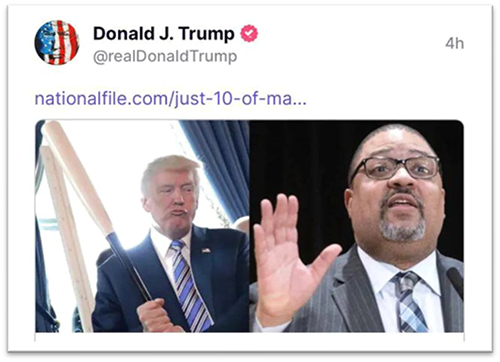
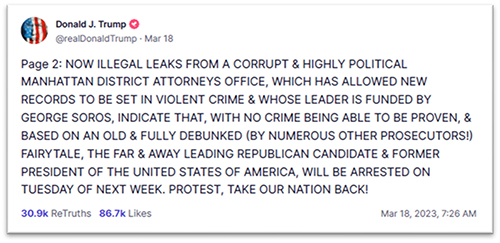
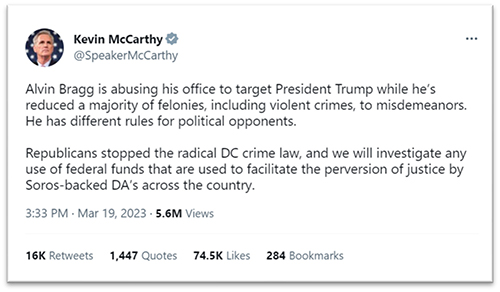
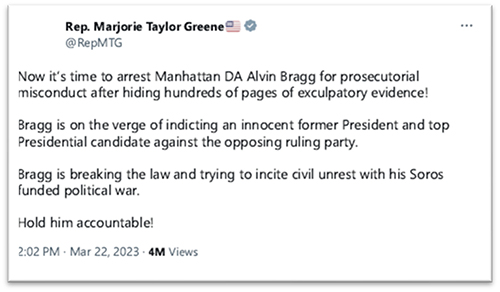
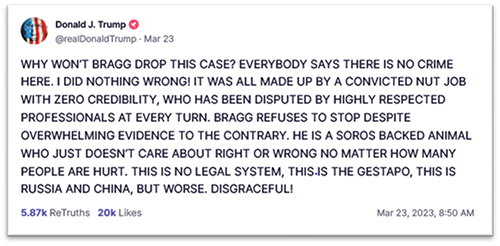
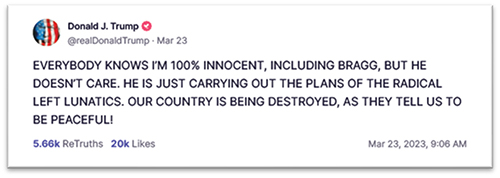
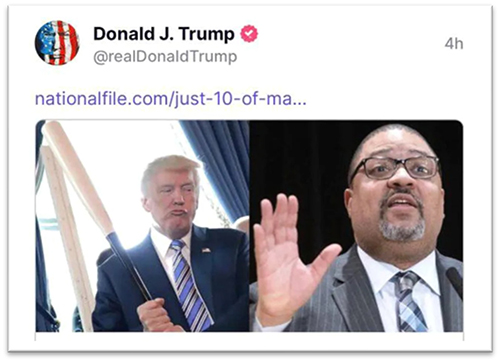
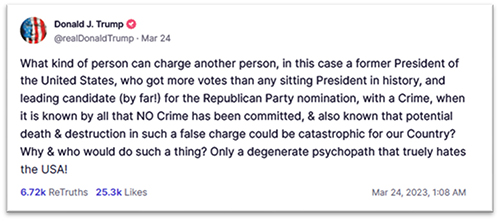
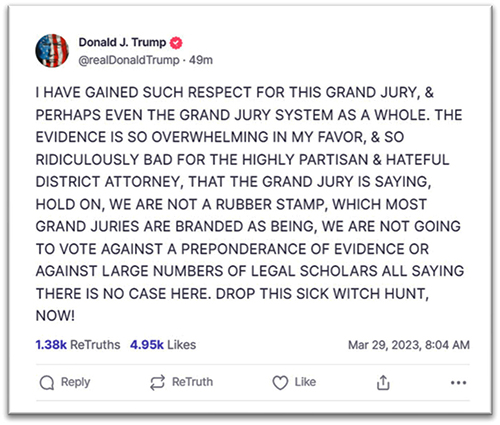
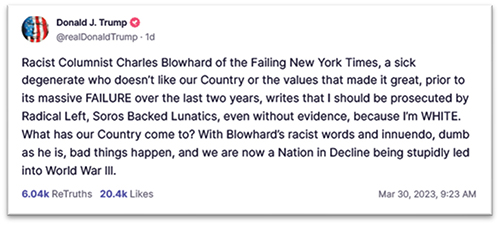
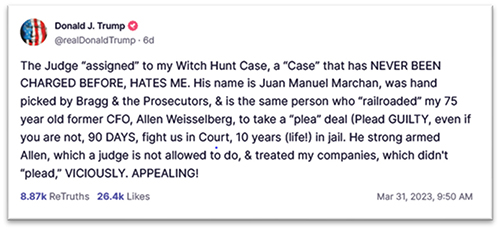
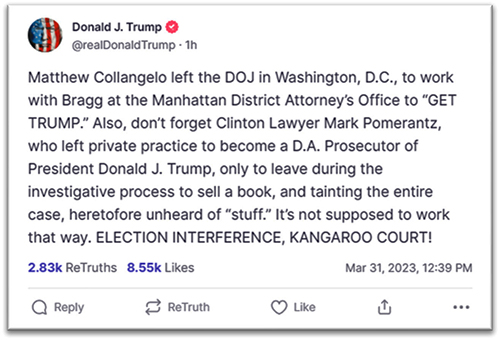
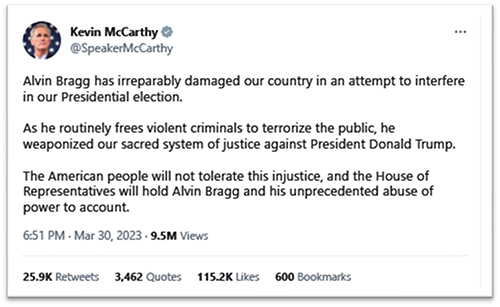
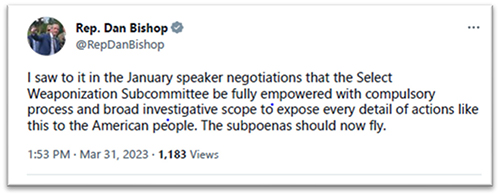
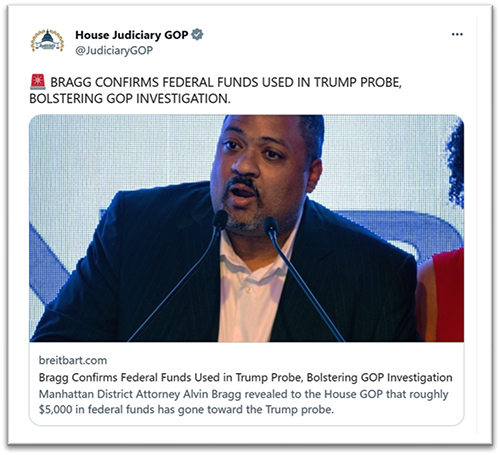
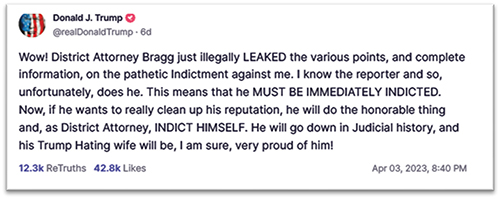
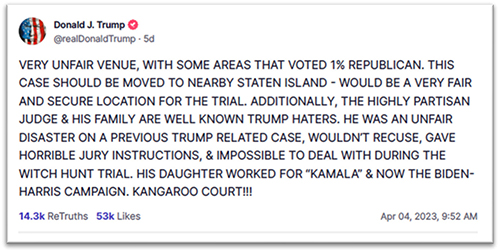
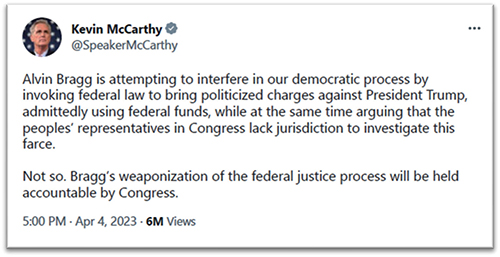
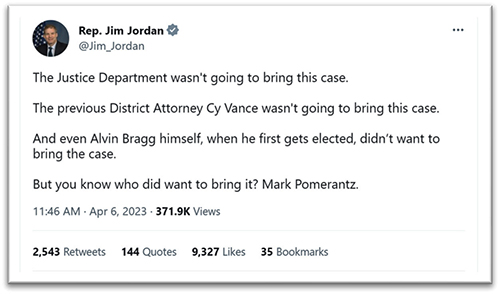
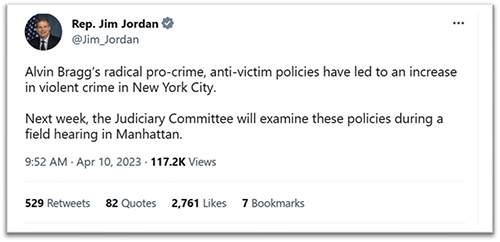
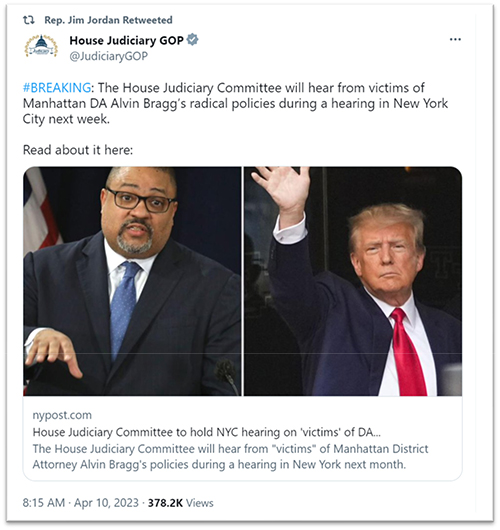
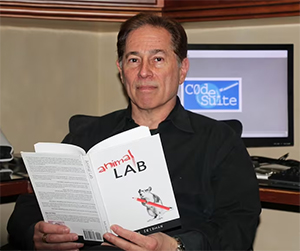
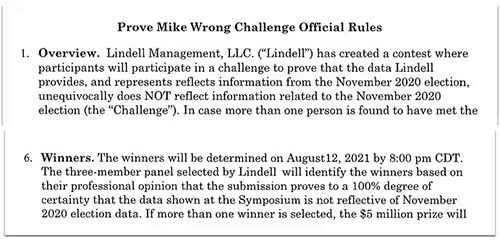
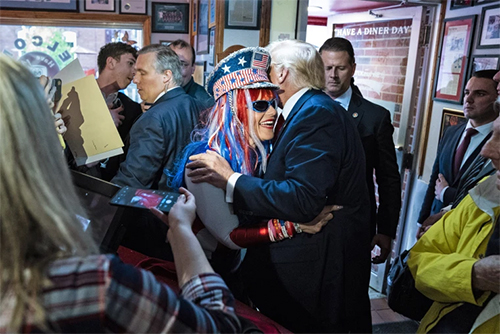
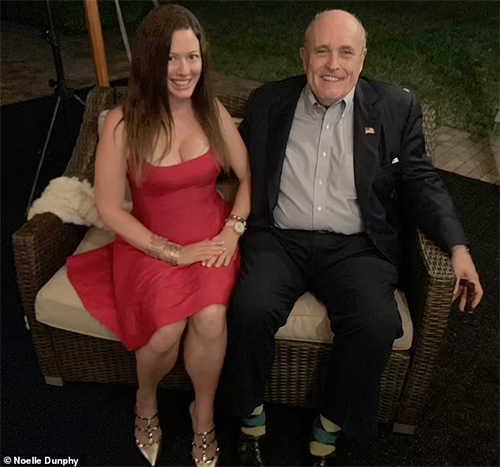 [/quote]
[/quote]